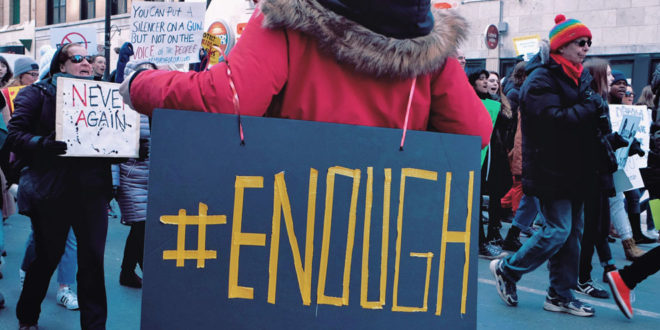I recently wrote a song with these opening lines, “Hey little man with that gun in your hand, is that what makes you feel strong? Do you need to kill the people that you don’t understand, to feel like you really belong?”
Violence Doesn’t Solve Anything
In a world that languishes to find lasting joy (where Mick Jagger sings, “I Can’t Get No Satisfaction”), violence is the one tool that many believe will bring them closer to achieving it. But in reality—violence is an expression of weakness. Violence is for those who have run out of options; who have grown weary of thinking things through; who have given up on reason.
The problem with using force to accomplish our objectives is that it never solves anything. Yes, we can use it to keep criminals off the streets. But ultimately we end up with an exorbitantly expensive prison system that contains what we cannot change. It is a societal statement of weakness to use the threat of prison as an incentive to get people to be nice.
Love can be exasperating, because sometimes it’s like driving home the long way. We want to be there already, but we have to take this long circuitous route before we can arrive at our destination. The Pharisees were frustrated with Jesus because they believed his view of God’s Kingdom was too long and circuitous. They wanted to cut to the chase, defeat the Romans and put a king on David’s throne. Now!
Another Kingdom
But Jesus spoke of another Kingdom that the meek would possess and the poor would inhabit; where weakness was viewed as an asset and children were considered among the greatest. Jesus had no immediate plan to displace the Romans, and because of this, the Pharisees viewed his theology as insufficient. Even though there was plenty of evidence that pointed to Jesus as the Messiah, the religious authorities chose to ignore it and used the tactics of darkness to promote their cause.
After blindfolding him, “They began to spit in Jesus’ face and beat him with their fists. And some slapped him, jeering, ‘Prophesy to us, you Messiah! Who hit you that time?'” (Matthew 26:67-68).
Instead of acting from a position of strength, the religious authorities responded from a place of weakness. They used violence to counter Christ’s message of love, thus aligning themselves with the enemy of God.
Free Choice
Forcing people to think or act against their will is not how God operates. He created us with an amazing capacity to choose our own course and to think independently. But evil has turned this gift into a curse, and without divine wisdom we are destined to make poor choices that will ultimately lead to our ruin. This is why we need God:
“Trust in the Lord with all your heart; do not depend on your own understanding. Seek his will in all you do, and he will show you which path to take. Don’t be impressed with your own wisdom. Instead, fear the Lord and turn away from evil” (Proverbs 3:5-7, NLT).
The Great Controversy
When Lucifer rebelled in heaven and begin to spread lies about God’s motives and actions, he was allowed to continue for a bit. However, he was eventually forced out, because he was undermining the very foundation of civil discourse, which is based upon love and compassion!
The controversy between good and evil represents two different ways of relating to people. The evil side uses coercion, force and violence, and there is plenty of evidence of how this works today (i.e. street gangs, ISIS, the Taliban, racism, murder, spouse abuse, war, sex trafficking, blackmail, etc.).
God’s Strange Act
On the other side, God promotes thoughtful reflection and freedom of choice. He does this to the point that he even respects a person’s right to make wrong choices. But when someone’s choices destroy the freedoms of others and their ability to choose, God operates from a position of justice. God eventually steps in to protect the innocent. To bring about closure and to finally eradicate sin from the universe, God will destroy those who refuse to be separated from evil (coercion, violence and hate). Scripture refers to this as one of God’s strange acts. It is strange because it is out of character with what he normally does.
“The Lord will come as he did against the Philistines at Mount Perazim and against the Amorites at Gibeon. He will come to do a strange thing; he will come to do an unusual deed: For the Lord, the Lord of Heaven’s Armies, has plainly said that he is determined to crush the whole land” (Isaiah 28:21-22, NLT).
M.C. Davis, from “Believer’s Magazine” explains it this way:
“God really delights to bless His creatures and to have fellowship with them, but the invasion of sin into creation has meant that He must exercise judgment, because He is not only love, but also light, absolutely holy, righteous, and good…God’s judgments are ‘his strange work,’ nor does He take any pleasure in the death of the wicked. Our God is ‘a consuming fire’ (Heb 12.29) …to those who are persistently rebellious and unrepentant.”
An Immunity to Sin
The antidote for sin is not hell. The remedy for sin is not the destruction of sinners. The cure is the long suffering patience of God towards earth’s offenders that eventually culminates in the Cross and the death of Jesus! Having embraced God’s grace, the redeemed will be given an immunity to sin. This means that its destructive power over their lives has been neutralized. Because they have given themselves fully to the principles of love and compassion, the idea of putting themselves above others has no appeal.
The destruction of the wicked is a continuation of God’s commitment to honor people’s choices and give them what they want. Those who are finally destroyed have committed themselves to the principles of darkness (coercion, violence and hate), which ultimately leads to death. Thus, God, in his mercy and out of a desire to honor each one’s choice, speeds up the long grueling march of evil-doers toward extinction and uses the fire to speed up the process and cleanse the earth.
Contrary to what many believe, hell is not God’s way to “get even” with rebellious, sinful people. Nor will the lost suffer in hell throughout eternity. This idea flies in the face of what we know about God and his sense of justice. The flames of hell are not eternal, but the results will be. After hell, love and compassion will reign supreme throughout the earth and universe—without any future threat of hate or violence ever returning. Those who have experienced sin and are redeemed from it are settled in their determination to pursue God’s way.
“The day of judgment is coming, burning like a furnace. On that day the arrogant and the wicked will be burned up like straw. They will be consumed—roots, branches, and all” (Malachi 4:1).
Sin Forever Laid to Rest
Thus, through God’s strange act, where he eliminates those who refuse to separate themselves from the ideologies of violence, coercion and hate, sin will forever be laid to rest!
“Then I saw a new heaven and a new earth, for the old heaven and the old earth had disappeared. And the sea was also gone. And I saw the holy city, the new Jerusalem, coming down from God out of heaven like a bride beautifully dressed for her husband. I heard a loud shout from the throne, saying, ‘Look, God’s home is now among his people! He will live with them, and they will be his people. God himself will be with them. He will wipe every tear from their eyes, and there will be no more death or sorrow or crying or pain. All these things are gone forever’” (Revelation 21:1-4, NLT).
Rich DuBose writes from Northern California.




